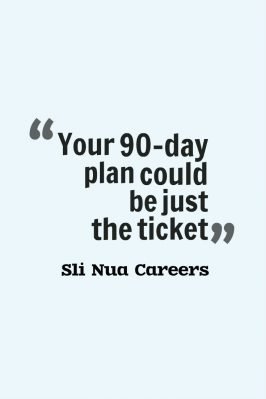Pic source www.pixabay.com
90-day plan
By Sabina Trench, Career Coach, Sli Nua Careers

When interviewing for a high-level job, you need to set yourself apart from the crowd. A good way to achieve this is through your 90-day plan, writes SABINA TRENCH, Career Coach, Sli Nua Careers.
What is a 90-day plan?
This is your blueprint for your first three months in the job. It identifies your short-term goals and actions that will ensure you start performing from day one. It should also identify those longer-term objectives you plan to initiate in the first 90 days.
Why should I develop a 90-day plan?
Walking into an interview with a strategy for your first 90 days in the role should help you to showcase your research and planning skills, strategic focus, and overall understanding of the role. It is also an excellent way to paint yourself into the position. Start talking about what you will do if given the position and the panel might be swept along in this journey with you.
 What should my 90-day plan include?
What should my 90-day plan include?
Firstly, this is a three-month plan for your new job. While it is great to show ambition and drive, you don’t want to come across too strong. Sweeping changes you have in mind for cutting 50 per cent of the product range could be couched with ‘assessing the current product portfolio to identify the most commercially viable ranges’, for example.
Your plan could also include tasks that you have in mind for three key areas. Ideally these would over and above what will be expected of you in the new job anyway. I could suggest people (new staff, new customers, new connections), products/services (innovations in the market and trends), and performance (evaluating and identifying new opportunities).
Whatever you choose, it might help to choose themes or key words to help you present a cohesive strategy.
Ideally, your plan should be precise. They should some measurable outcomes where possible. SMART objectives are also useful (Specific, Measurable, Attainable, Realistic, Time bound). A thorough review of the job specification should help you to frame your plan around the correct actions, and most importantly, those that matter most to your new employer.
Does the plan need to be very detailed?
In short, no. You won’t have time to discuss a really detailed plan, and if you are not an internal candidate, the amount of inside information you have may be limited.
Stick to headline points, but make sure that the plan is focussed on what you can do to start contributing immediately to the business or organisation. Your plan is not about your personal career goals.
What if they don’t ask me for my 90-day plan in the interview?
If they don’t, then it is up to you to include it at an appropriate point.
For example, if they ask for ideas, or ‘how will you make a difference in the new job?’ And what about the question at the end of the interview, ‘is there anything more you would like to add?’
Believe me, there will be opportunities, you just need to decide at what point you will get the most impact from this answer.
If you are interviewing for a high-level position, you need high-level responses and your 90-day plan might be just the ticket.
If you would like to make a booking with any of our career coaches, see HERE for CV Preparation, Application Form writing, LinkedIn Profile writing, Interview Training and other career services.
You can read more blogs from Sabina HERE
Sabina Trench is a Career Coach with Sli Nua Careers, who have offices in Galway, Limerick, Athlone, Sligo and Mayo, plus a full online service. Their services include CV preparation, interview training, personal statements and application forms.